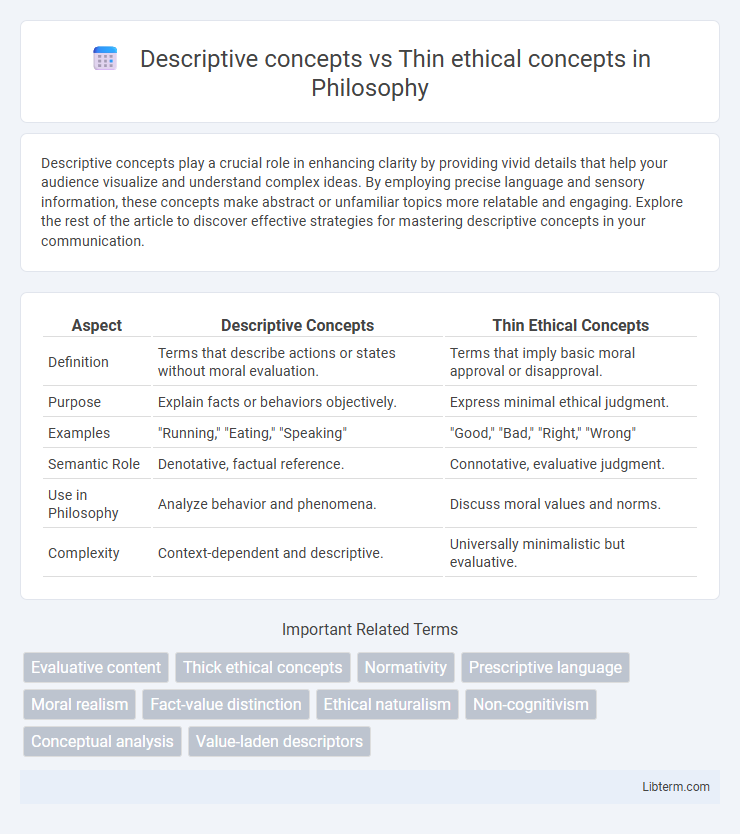Descriptive concepts play a crucial role in enhancing clarity by providing vivid details that help your audience visualize and understand complex ideas. By employing precise language and sensory information, these concepts make abstract or unfamiliar topics more relatable and engaging. Explore the rest of the article to discover effective strategies for mastering descriptive concepts in your communication.
Table of Comparison
| Aspect | Descriptive Concepts | Thin Ethical Concepts |
|---|---|---|
| Definition | Terms that describe actions or states without moral evaluation. | Terms that imply basic moral approval or disapproval. |
| Purpose | Explain facts or behaviors objectively. | Express minimal ethical judgment. |
| Examples | "Running," "Eating," "Speaking" | "Good," "Bad," "Right," "Wrong" |
| Semantic Role | Denotative, factual reference. | Connotative, evaluative judgment. |
| Use in Philosophy | Analyze behavior and phenomena. | Discuss moral values and norms. |
| Complexity | Context-dependent and descriptive. | Universally minimalistic but evaluative. |
Introduction to Ethical Concepts
Descriptive concepts in ethics provide objective observations about actions, motives, or consequences without making value judgments, serving as factual foundations for moral analysis. Thin ethical concepts, such as "good" or "bad," combine descriptive content with a minimal evaluative element, enabling quick moral appraisals while lacking detailed ethical nuance. Understanding the distinction between these concepts is crucial for ethical theory as it clarifies how language conveys both factual and moral information in moral reasoning.
Defining Descriptive Concepts
Descriptive concepts provide objective, factual information about phenomena, enabling clear identification and classification based on observable attributes or states. They operate independently of evaluative judgments, focusing on what "is" rather than what "ought" to be, and are essential in empirical research and scientific inquiry. Defining descriptive concepts requires precise criteria and measurable indicators to ensure consistency, clarity, and replicability in understanding complex realities.
Understanding Thin Ethical Concepts
Thin ethical concepts, such as "good" and "bad," are fundamental evaluative terms that carry both descriptive content and normative force, enabling basic moral judgments. Unlike descriptive concepts, which purely represent facts or states of affairs, thin ethical concepts inherently express approval or disapproval, making them essential for moral reasoning and ethical deliberation. Understanding thin ethical concepts involves recognizing their dual role in conveying evaluative meaning while remaining relatively general and open to contextual interpretation.
Key Differences Between Descriptive and Thin Ethical Concepts
Descriptive concepts refer to terms that objectively characterize or describe facts, behaviors, or states without implying any moral judgment, such as "cold" or "tall." Thin ethical concepts, like "good" or "wrong," combine descriptive elements with a basic evaluative dimension, expressing a minimal moral assessment while remaining relatively abstract. The key difference lies in the evaluative content; descriptive concepts lack moral evaluation, whereas thin ethical concepts inherently include a simplified ethical judgment.
The Role of Language in Ethical Concepts
Descriptive concepts in ethics provide objective information about behaviors or situations, grounding ethical discussions in observable facts, while thin ethical concepts such as "good" or "wrong" combine descriptive content with evaluative meaning, reflecting moral judgments. The role of language in ethical concepts is crucial because it shapes how moral attitudes and evaluations are communicated, influencing both understanding and discussion of ethical issues. By analyzing the linguistic structure of these concepts, philosophers reveal how language not only conveys facts but also expresses approval or disapproval within moral discourse.
Examples of Descriptive Concepts in Ethics
Descriptive concepts in ethics refer to terms that explain or describe behaviors and states without implying moral judgment, such as honesty, kindness, or courage. These concepts provide a neutral observation of actions or character traits, for example, noting that someone is kind or truthful, without asserting whether those traits are ethically good or bad. Thin ethical concepts, like "wrong" or "good," carry inherent evaluative meaning, whereas descriptive concepts serve as foundational descriptions that aid in understanding moral phenomena without evaluative connotations.
Examples of Thin Ethical Concepts
Thin ethical concepts include terms like "good," "bad," "right," and "wrong," which convey fundamental moral evaluations with minimal descriptive content. These concepts serve as basic evaluative judgments applicable across diverse contexts without detailing specific characteristics of actions or entities. In contrast to thick ethical concepts, which combine descriptive and evaluative elements, thin concepts function primarily to express approval or disapproval in ethical discourse.
Importance in Moral Philosophy
Descriptive concepts provide factual information about actions or traits, forming the empirical basis for moral analysis, while thin ethical concepts, such as "good" and "bad," carry both descriptive and evaluative content essential for moral judgment. Thin ethical concepts bridge the gap between observation and normative evaluation, enabling philosophers to articulate ethical assessments grounded in human behavior and societal norms. Their importance in moral philosophy lies in facilitating nuanced discussions about right and wrong, guiding ethical decision-making and theoretical frameworks.
Implications for Ethical Analysis
Descriptive concepts refer to empirical or factual notions that describe states of affairs, while thin ethical concepts include terms like "wrong" or "good" that carry minimal evaluative content but are essential for moral judgments. The distinction impacts ethical analysis by requiring clarity in separating objective facts from normative evaluations, ensuring that ethical reasoning is not conflated with descriptive statements. This separation aids in constructing coherent moral arguments and evaluating ethical claims with precision and philosophical rigor.
Conclusion: The Significance of Concept Distinction
Distinguishing between descriptive concepts and thin ethical concepts clarifies their distinct roles in moral philosophy and language analysis, enabling more precise ethical judgments. This differentiation highlights how descriptive concepts convey factual information, while thin ethical concepts embed evaluative meaning, impacting moral reasoning and communication. Recognizing this conceptual divide enhances philosophical discourse and supports clearer interpretation of ethical arguments in both academic and practical contexts.
Descriptive concepts Infographic

 libterm.com
libterm.com